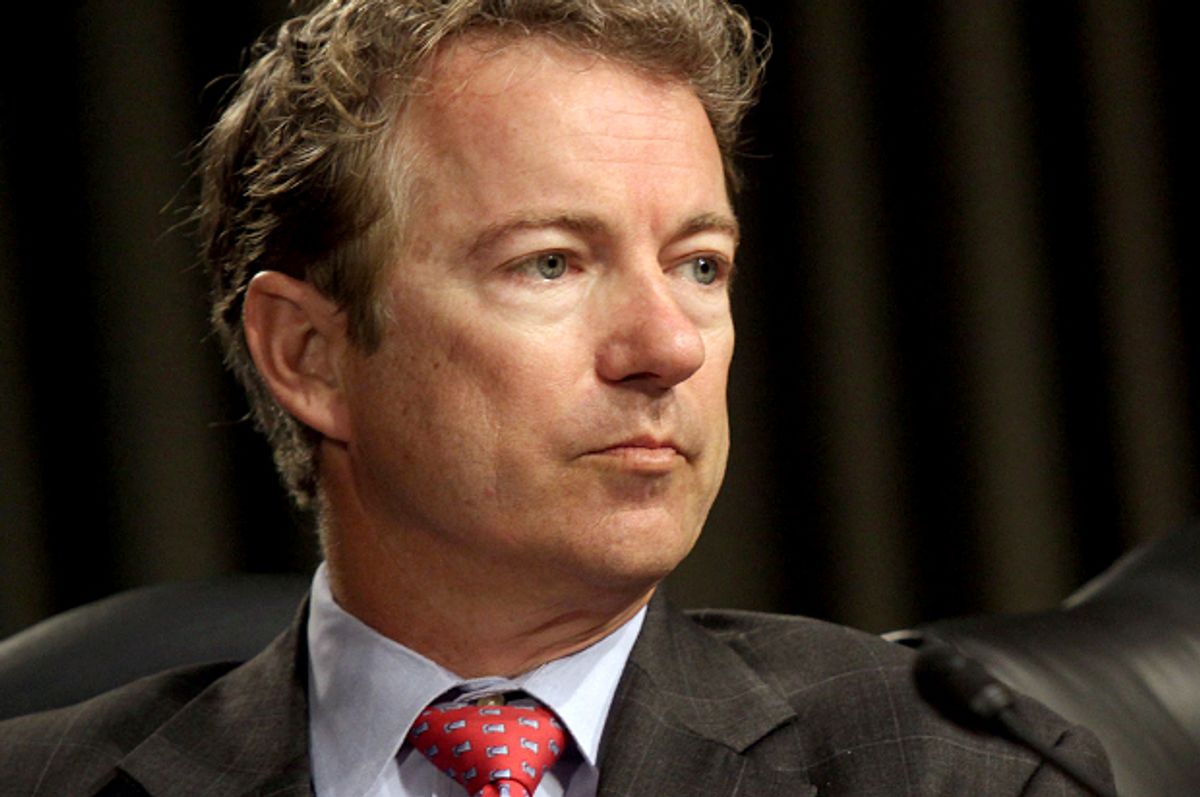In a new interview with Politico's Mike Allen, Kentucky senator and likely 2016 GOP presidential contender Rand Paul asserts that the next Republican nominee could win one third of the African American vote by running on a platform of criminal justice reform, "school choice," and "economic empowerment." That agenda, however, won't bring the GOP anywhere near the 27 percentage point improvement over 2012 that Paul insists is possible.
“If Republicans have a clue and do this and go out and ask every African-American for their vote, I think we can transform an election in one cycle,” Paul told Allen. "That doesn’t mean that we get to a majority of African-American votes in one cycle,” the senator added, “but I think there is fully a third of the African-American vote that is open to much of the message, because much of what the Democrats has offered hasn’t worked.”
As Allen notes, Paul has made a concerted effort to reach out to African American voters, going far and beyond what most other leading Republicans have attempted. He spoke out on Ferguson before even Democrats like Hillary Clinton weighed in, visited the city last week, and has opened a "GOP engagement office" in a predominantly black Louisville neighborhood. The senator, who will speak at the National Urban League convention in Cincinnati in November, has certainly come a long way from his cringe-worthy appearance at Howard University last year, during which Paul condescended to the students at the historically black university by asking his audience whether they knew basic facts of African American history.
Outreach, while laudable, is one thing. Proposing an agenda that would actually address African Americans' concerns is another matter entirely. And Paul's three-pronged strategy for appealing to black voters simply fails on the latter score. Let's say Paul or some other candidate espousing his message captures the GOP nod in 2016. Support for criminal justice reform is indeed commendable, and represents a shift away from the tough-on-crime message the GOP has pushed for the past half century. (Most of the party has yet to abandon it.) But what about "school choice" -- code for the education reformers' agenda of privatization and dismantling the public education system as we know it? The "education reform" agenda has wreaked havoc upon African American communities in cities like Chicago, where an estimated 150 neighborhood schools have been shuttered since 2001, with African Americans representing 88 percent of affected students.
And "economic empowerment"? A 2012 NAACP poll of black voters in battleground states found that 60 percent considered jobs their most important concern, and 95 percent of respondents saw a role for the federal government in creating jobs. But don't count on a libertarian acolyte like Paul to propose a serious federal jobs program. Even as market forces have left many African Americans impoverished and shut out of social and economic networks, Paul adheres to the magical fantasy that if only the overweening government would get out of the way, the free market would work its economic miracles.
Paul's past criticism of the Civil Rights Act of 1964 is perhaps the prime example of this market fundamentalism. In criticizing the law's nondiscrimination requirements for businesses, Paul contended that the free market would check against discriminatory business owners -- consumers would refuse to patronize bigots. Paul may have walked back his criticism once it became politically untenable, but African American voters will have a hard time overlooking his earlier view that discrimination is an "inalienable" right. Having confronted both overt racism (like the kind expressed in Ron Paul's newsletters) and structural racism, they're unlikely to take kindly to a candidate so blinded by free market dogma that he thinks the market can solve even the most entrenched of American social problems.
Let's not forget, either, that even a better messenger than Paul would probably do no better convincing African Americans to return to the party of Lincoln. Just as the Republican Party's down-ballot candidates helped drag down Mitt Romney in 2012, so too will the GOP's racially tone-deaf (at best) candidates damage the ticket's performance in 2016. This is a party, after all, populated by a breathtaking number of people who believe that "blah people" are greedily feeding at the government trough, that our first African American president is an illegitimate foreigner, and that racism against whites is a bigger problem than racism against blacks -- a party that to this day continues to run race-baiting, Willie Horton-style attack ads. That's an image which will take a lot more than a few policy concessions, some clever sloganeering, and a handful of outreach offices to overcome.

Shares